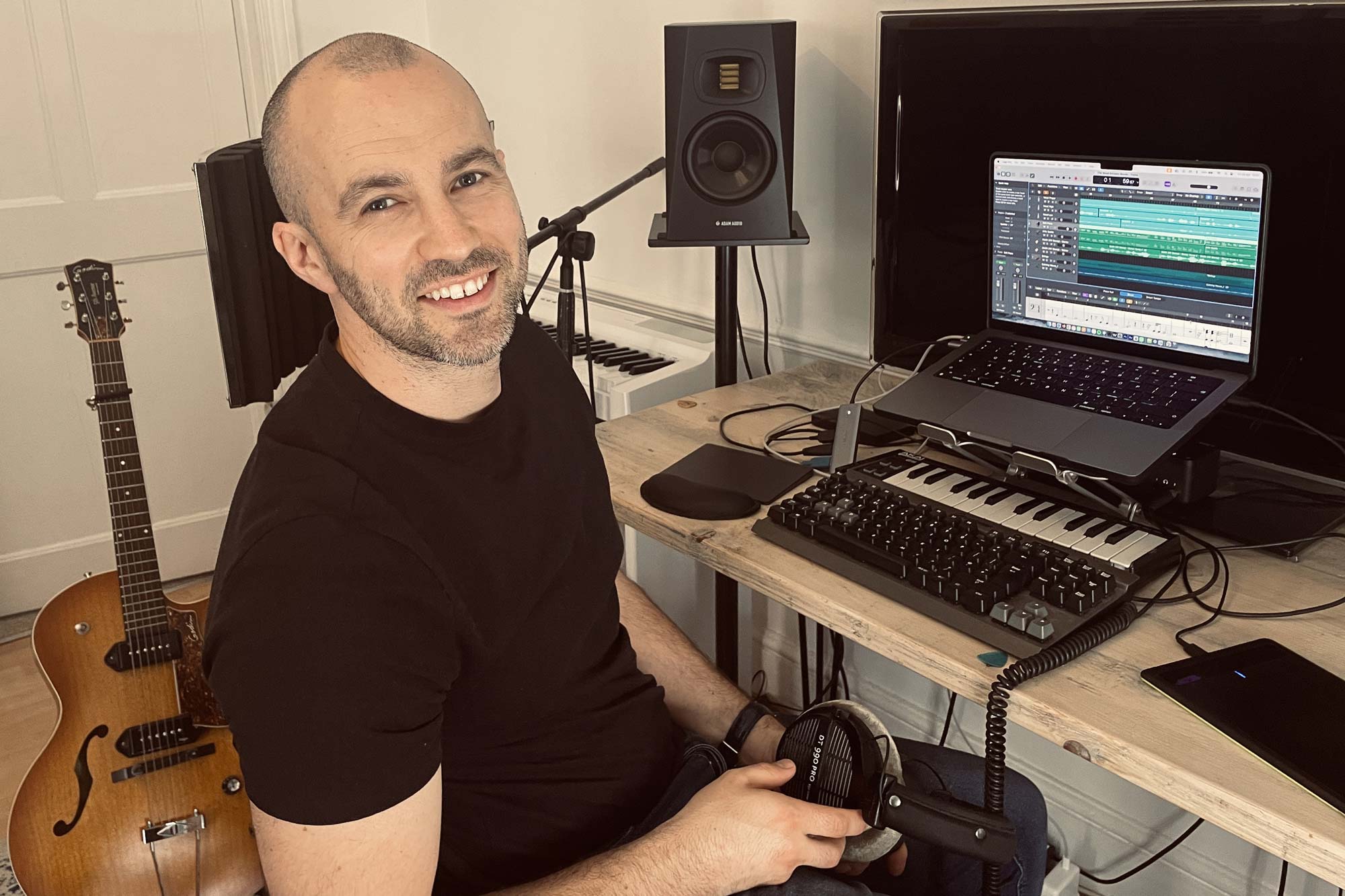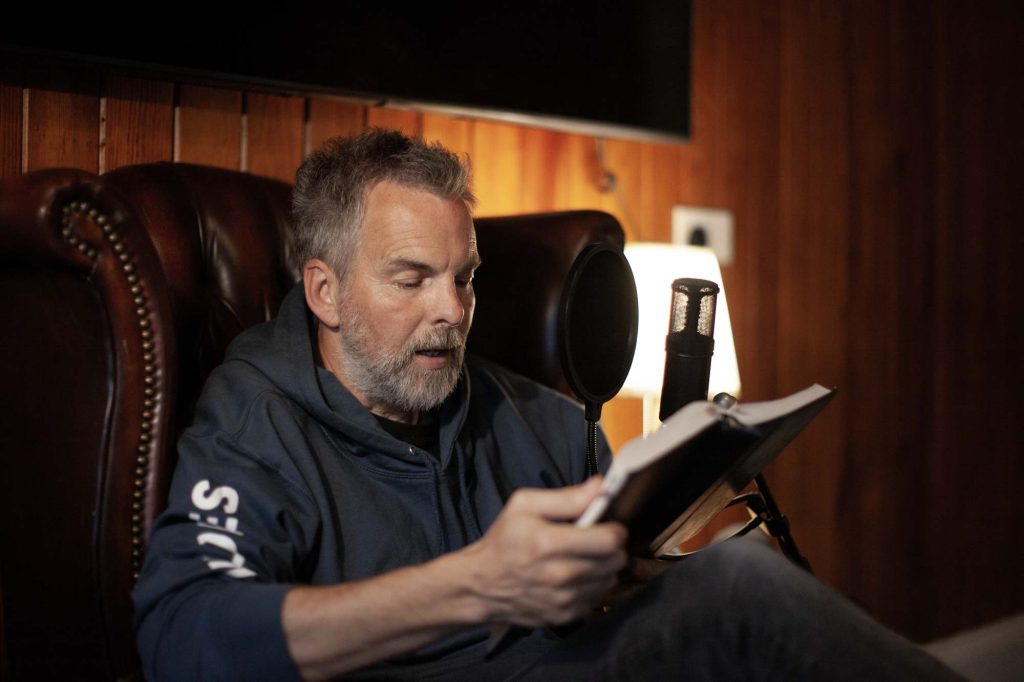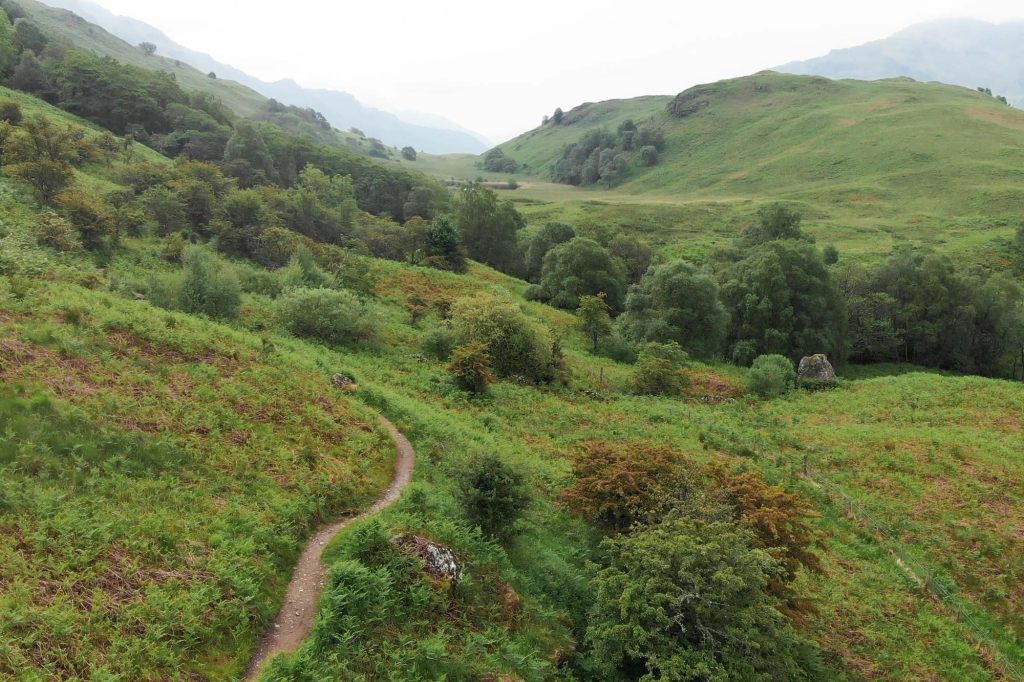
Have you ever wondered how the sound of Lectio 365 comes together – the reflections, Bible readings and music becoming a Lectio 365 devotional? We interviewed Rich Dawson, who produces Lectio 365 audio and also writes music for the devotionals.
When we started, it used to be a very small group of hosts and they would go away on their writing retreats and then organise for me to record all of them and then mix that with Bible readers. Then during the pandemic, everyone started shipping mics everywhere so that they could record it at home, which meant that we were able to take it global. So we now have voices from all over the world, both hosts and Bible readers.
One of the things I have to do is to try and get rid of ‘plosives’ – pop sounds, sometimes they need to do another take, then we’ll clean that up or cut that out. You want it to not sound jarring going from host to Bible reader – you want to try and make it as smooth as possible. You don’t want someone who’s got a boomy voice, and then someone who’s got a really thin voice, so you try and use the EQ to find a middle ground there.
We have some hosts who value going into a studio, and that way they’ve got an engineer right there, and who can listen and say, “redo that line”, which is great.
I think most hosts and Bible readers are recording from their homes, and so we’ve got a guide to help turn their home into a studio as much as possible – trying to get cushions and things like that, and advice on mic techniques, so that they can get as clear and clean a sound as possible before sending it over.
Phil doesn’t record for Morning Prayer anymore – but he does Lectio for Families. He’s probably the best one take wonder, I think. But you will definitely get lots of laughs along the way, people misreading things, stumbling over the words, or pausing to change a script mid-recording.
So sometimes people will cut that out themselves and not send you that. But sometimes you hear their thought processes, or their laughs and retakes.
It was both incredible and exhausting, such a special experience. Both Pete and Charlie are so fun to work with, and to go with on big adventures.
We had the first two thirds of the day walking and leaning into the pilgrimage side of things while also doing the photography and videography. And then when we stopped, the first thing we’d do is get the video podcast done, and reflect on the day. And then we would get our makeshift recording studio, whether that was in the van, or sometimes we would stay in a hostel, we’d set it up and do the devotionals. I was mixing through into the evening, we’d finish and go to bed. And then, you’re up at about seven or eight and quite quickly getting on the road to walk for the next day. So it was intense, but a real privilege to be able to do that as well.

The music for the series was composed before going on the pilgrimage, because we had to get that turnaround – as soon as we’re walking, we’re recording, mixing, releasing. But the extra music, it was sort of accidental.
The first day it happened, I had half an hour while Pete was cooking dinner. And it was a great experience, because usually you can sometimes get overly attached to a song and the structure and you labour on it for way too long.
I approached it just like a journal entry, and knew I had only a few minutes to reflect on what God was doing in me. And so that first song, ‘East from Oban’ was done in that half hour period and then I played it for Pete and Charlie while we’re eating dinner. And then we’d just continue to write along the way.
So you’d maybe record a little voice note while you’re walking. And then, in the evenings, if there was any time to squeeze out for writing, we’d do that. We’d include those songs in our video diaries, and people were really responding well to them. They were finding another layer to helping them feel connected to what we were doing on the pilgrimage, so I decided to just release those songs as they were.
All creativity is a gift from God, sort of handed to you. And it’s not something that you really must do. So I do look at those songs as God’s kindness of giving these things to help me process the pilgrimage myself, but then also hopefully help others on their own life’s journeys.

I’m actually recording a track right now for midday prayers, they’ve got an ‘Eastertide’ – the journey from Easter to Pentecost. So the writers will have the scripts done and ready and I’ll ask them to share any of the major themes. With this one coming up, it’s about the Holy Spirit, but using the imagery of oil, wind, and fire. And so those words themselves will be helpful in thinking of what kind of sounds make me think of those words to describe the Holy Spirit.
In the Lent series, I used a Xhosa word, ‘uxolo’, which means peace. And I sung that – you won’t really be able to hear it at all – but I was singing that throughout the track. So declaring, in Lent, the idea of speaking peace over the listener.
For the Pilgrimage series, it was marrying the idea of Braveheart – these big, romantic, Celtic sounds – with the feel of Into the Wild, the soundtrack from Eddie Vedder, which is a bit more of a folky, adventure sound. So marrying that with thinking about it from a prayerful point of view: how will this relate to the listener? How will this bring peace to the listener?
These days, I think peace is something that I’m really drawn to, how to soothe the tormented soul – how someone can come and they’re not just being ministered to by what’s being spoken or by the scriptures and the prayers, but also by the music – that in some way, the Lord can be working in them and through them, through this sound of Lectio 365.
It’s actually not a massive pool, it’s quite restrictive, really. A lot of it is piano-led, especially night prayers and some of the morning prayers. I’ve lent into using the guitar more for midday prayers, because they’re a little more on-the-go. So I’m trying to get a little bit more energy into that.
Something that I use all the time is an EBow – you use it on the guitar, but it basically turns the guitar into a cello.
For Pilgrimage, I used a Chanter, which is a practise Bagpipe. And I’m so bad at it that I don’t know how many takes it is to get one line of it, and then I had to hit it with pitch correction, reverb, play the part on guitar as well, and sort of marry the two together, just to try and make it palatable!
I do use a double bass now and then for extra bowed parts. And then obviously the vocals; there’ll be layered vocals to give that sense of a very distant choral chamber choir in the background. But everything starts on a piano or on a guitar, and then I layer up from there.
I think it’s a great tool to help create that inner room space with God, while also connecting to the global church. In this world, we’re so insular, and often we need to come away to the inner room with God and have that still, small space. But to be able to do that, where you know that your prayers are being shared, your quiet times are being shared with people all around the world is quite a privilege that makes you both feel connected to God.
And you can have a word that feels like that that was written or that verse was chosen that day, specifically for you. And it feels so personal, but equally, you feel connected to the global church. And I think that’s what is so special about Lectio 365.
You can find out more about Rich Dawson’s music at linktr.ee/richdawson